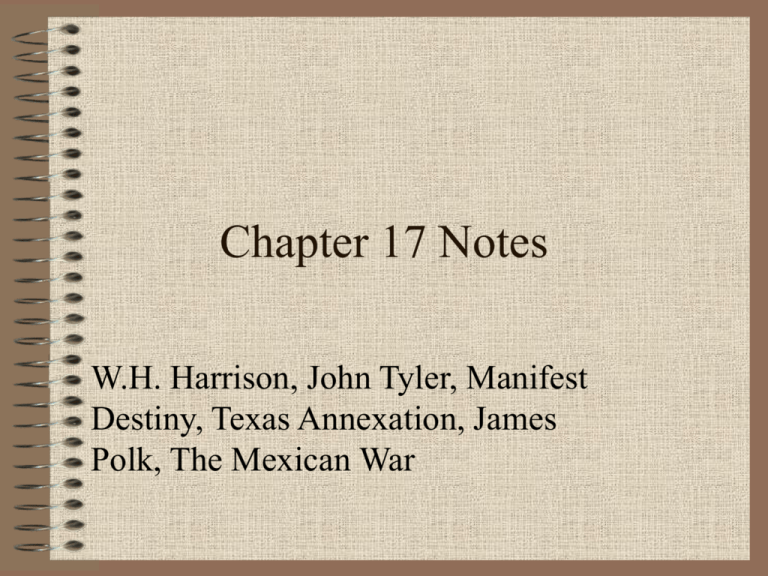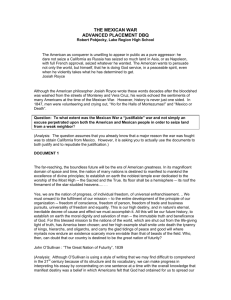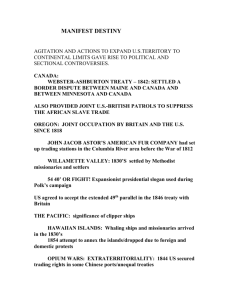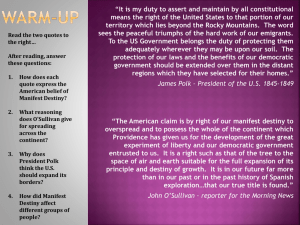
Chapter 17 Notes
W.H. Harrison, John Tyler, Manifest
Destiny, Texas Annexation, James
Polk, The Mexican War
William Henry Harrison
William Henry Harrison
1773-1841
• Ninth president of the United States,
western military hero, territorial
administrator, congressman, and diplomat.
• Harrison, in a cold, pouring rain, gave
the longest inauguration speech ever
delivered, contracted pneumonia, and
died a month later.
• He served the shortest time in office of any
president and was the first to die in office
John Tyler
John Tyler
1790-1862
• Tenth president of the United States. Tyler
was the first to ascend from the vice
presidency through the accident of a chief
executive's death.
• "His Accidency" was also only the second
politician to switch parties before attaining
the White House and the first to be driven
from his party before departing
Pennsylvania Avenue.
Manifest Destiny
• The term manifest destiny originated in the 1840s. It
expressed the belief that it was Anglo-Saxon
Americans' providential mission to expand their
civilization and institutions across the breadth of
North America.
• The phrase was first employed by John L. O'Sullivan in
an article on the annexation of Texas published in the
July-August 1845 edition of the United States Magazine
and Democratic Review, which he edited. It was,
• O'Sullivan claimed, "our manifest destiny to overspread
the continent allotted by Providence for the free
development of our yearly multiplying millions."
• The term and the concept were taken up by those desiring
to secure Oregon Territory, California, Mexican land
in the Southwest, and, in the 1850s, Cuba.
Texas Revolution and Annexation
Fall of the Alamo by Robert Jenkins Onderdonk
Fall of the Alamo by Robert Jenkins Onderdonk
Although they were greatly outnumbered, Texas forces held off a siege at the
Alamo by the Mexican army under Antonio López de Santa Anna. The old
mission's walls were eventually breached, however, and the Texans were
overcome in hand-to-hand fighting. This painting is an artist's conception of the
last moments of battle, before the remaining Texans were finally defeated.
(Friends of the Governor's Mansion)
Copyright © Houghton Mifflin Company. All rights reserved.
Annexation of Texas
• Independence was not what many Texans really desired.
• Voters elected Houston president, but also
overwhelmingly endorsed union with the United States.
• The Jackson and Van Buren administrations spurned
annexation, however. They feared both diplomatic trouble
and the political consequences of pressing for the
admission of a territory in which slavery, now
constitutionally protected, was growing rapidly.
• Many southerners, eager to secure and expand America's
slaveholding territory, worried that Britain intended to
promote abolition in Texas.
• The health of that system did not overly concern
President John Tyler either. Having alienated both parties,
he vainly hoped the Texas issue might win him a new
following.
Consequences
• James Buchanan would later compare Texas to the Trojan
horse.
• Its admission hastened the unraveling of the national
parties.
• Many Van Buren Democrats, convinced that southerners
had ridden roughshod over them in 1844, found their way
into the Free-Soil or even the Republican movements.
• Annexation helped provoke war with Mexico, bringing
America additional southwestern territory and fatally
linking the politics of slavery and expansion.
• In June 1845 the republic's Congress accepted U.S.
statehood.
James K. Polk by George Peter Alexander Healy, 1846
James K. Polk by George Peter
Alexander Healy, 1846
Lacking charm, Polk bored even his
friends, but few presidents could match
his record of acquiring land for the
United States. (James K. Polk Memorial
Association, Columbia, Tennessee)
Copyright © Houghton Mifflin Company. All rights reserved.
James A. Polk
1795-1849
• Eleventh president of the United States.
• Polk was the son of a prosperous
Tennessee farmer. His mother, a devout
Presbyterian, made an indelible impression
on his character, instilling Calvinistic
virtues of hard work, self-discipline,
individualism, and a belief in the
imperfection of human nature.
Oregon Territory
• Maine Boundary Settlement, 1842: Daniel
Webster negotiates a deal with Britain and the
United States over territory in Maine but also
gave territory further west for both nations while
keeping both nations out of war.
• 54-40 forever or Fight!!
• 49* vs. Columbian River
• Early in 1846, United States finally got the rest of
Oregon Territory without a fight at the 49*
parallel.
The Mexican War
How it Began
• Relations between the two countries had been strained
almost from the moment Mexico won its independence
from Spain in 1821.
• Wracked by frequent revolutions, Mexico remained weak
and unstable and was often dominated by dictators.
• As a result of the disorder, the United States, France, and
Great Britain lodged claims against the government for
damages inflicted upon their nationals and property.
• The American claims were submitted to a commission for
arbitration, which settled on a figure of about $2 million.
• When the Mexican government defaulted, sentiment
among Americans for collecting the claims by force
increased, and some urged that war be declared.
Mexico’s Reaction
• Mexico's grievance against the United
States focused on the issue of Texas.
• Mexico had never recognized Texas's
independence and made plans to recapture
the area.
• As Congress debated the issue, Mexico
made it clear that the permanent loss of
Texas would be sufficient cause for war.
•
•
•
•
•
•
•
Fears for the safety of Texas and rumors that Mexico would transfer
California to Great Britain in lieu of its debt payment, heightened American
sensitivity to Mexico's threats and moved Americans closer to a war spirit.
Mexico recalled its minister in Washington and broke off diplomatic
relations.
In response, U.S. troops commanded by Gen. Zachary Taylor entered
Texas to protect the region until annexation was completed. Mexico
countered by dispatching an army to the south bank of the Rio Grande.
Hoping to avoid war with Mexico (conflict with Great Britain over the
Oregon country loomed), President Polk sent an emissary, John Slidell, to
the Mexican capital with instructions not only to negotiate a settlement of the
claims and Texas issues but also to offer to buy New Mexico and California.
Slidell arrived in early December amid a wave of anti-American feeling,
and the government refused to receive him.
The Mexican president, who it was said favored conciliation with the United
States, was overthrown in a military coup.
He was replaced by an officer who announced his intention to restore Texas
to Mexico while he made overtures to European nations for the establishment
of a monarchy in Mexico in return for aid against the United States.
And So It Begins…
• Following the admission of Texas to the Union in December 1845,
Taylor's army was ordered to the Rio Grande, the traditional
boundary of the American claim to Texas dating back to the early years
of the century.
• The opposing Mexican force received orders to attack the Americans,
and in late April, the commanding general informed Taylor that
hostilities had begun.
• An American patrol was ambushed north of the Rio Grande, followed
quickly by a movement of the Mexican force across the river.
• The two armies clashed in the Battles of Palo Alto and Resaca de la
Palma in early May 1846.
• Although outnumbered, Taylor's army was victorious in both
engagements.
• Slidell's rebuff by the Mexican government and news of the first
American losses along the Rio Grande persuaded President Polk and his
cabinet to ask that Congress recognize a state of war with Mexico.
• The war resolution passed on May 13, 1846 with only token
opposition.
•
•
•
•
•
•
•
Congress authorized the enlistment of fifty thousand volunteers, assigning
quotas to the states closest to the fighting.
The government increased the size of the regular military forces,
appropriated money for the production of equipment, and requisitioned ships
to carry the troops to Mexico.
There were three areas of military operation. Taylor's army penetrated
northern Mexico, occupied the important city of Monterrey, and
defeated a larger Mexican army commanded by General Santa Anna at
the Battle of Buena Vista on February 22-23, 1847.
In the meantime, an army under the command of Stephen W. Kearny
followed the Santa Fe Trail to New Mexico, occupied Santa Fe, and
moved westward to the Pacific where it joined naval units in the
occupation of California.
Impatient to end the war, Polk opened a third operation against Mexico
City itself.
Commanded by Winfield Scott, an army made up largely of volunteers
landed at Veracruz in March 1847 and marched inland, defeating the
opposing forces in hard-fought battles at Cerro Gordo and in the Valley of
Mexico.
The capital was occupied in mid-September 1847.
GENERAL
SCOTT'S
ENTRY INTO
THE CITY OF
MEXICO.
The Treaty
• The Treaty of Guadalupe Hidalgo, which ended
the war, was signed early in February 1848.
• Mexico ceded New Mexico and California to
the United States and, in recognition of the
loss of Texas, agreed to the Rio Grande
boundary.
• In return, the United States assumed the
claims of its citizens against Mexico and paid
Mexico an additional $15 million to help the
country achieve long-needed fiscal stability.
The Effects
• The Mexican War was costly for the United States.
• Its military forces suffered almost thirteen thousand deaths,
although only seventeen hundred were battle-related, the rest
resulting from disease that swept through the army camps.
• Nevertheless, the war was popular. It was the first war covered
by large numbers of correspondents, as the nation's press
competed for war news.
• Some members of the Whig party and the abolitionists opposed the
war, the former because they felt it was unconstitutional, the latter
believing erroneously that it was part of a slaveholders' conspiracy to
extend slavery.
• For many Americans, the war was a romantic venture in a distant and
exotic land.
• The campaigns were often compared with the Spanish conquest of
Mexico in the sixteenth century, which had recently been popularized
by the historian William Hickling Prescott.
Consequences
• America's triumph seemed to confirm the
superiority of democratic institutions, and
literary figures like Walt Whitman and James
Fenimore Cooper saw it as part of a worldwide
mission to extend democratic ideals.
• Like most wars, however, this one left serious
questions in its wake.
• The issue of whether slavery should be
allowed in the lands taken from Mexico, first
debated in 1846, set in motion a constitutional
debate between the North and South that would
dominate future political discourse, eventually
dividing the Union itself.







